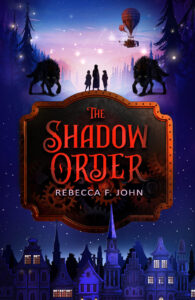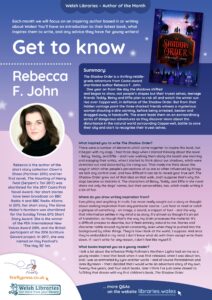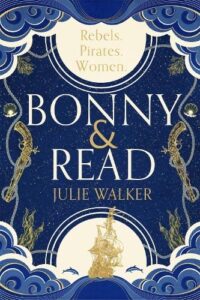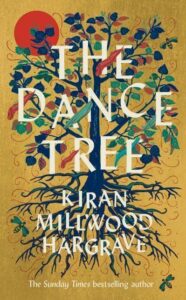Rebecca F. John
September 6, 2022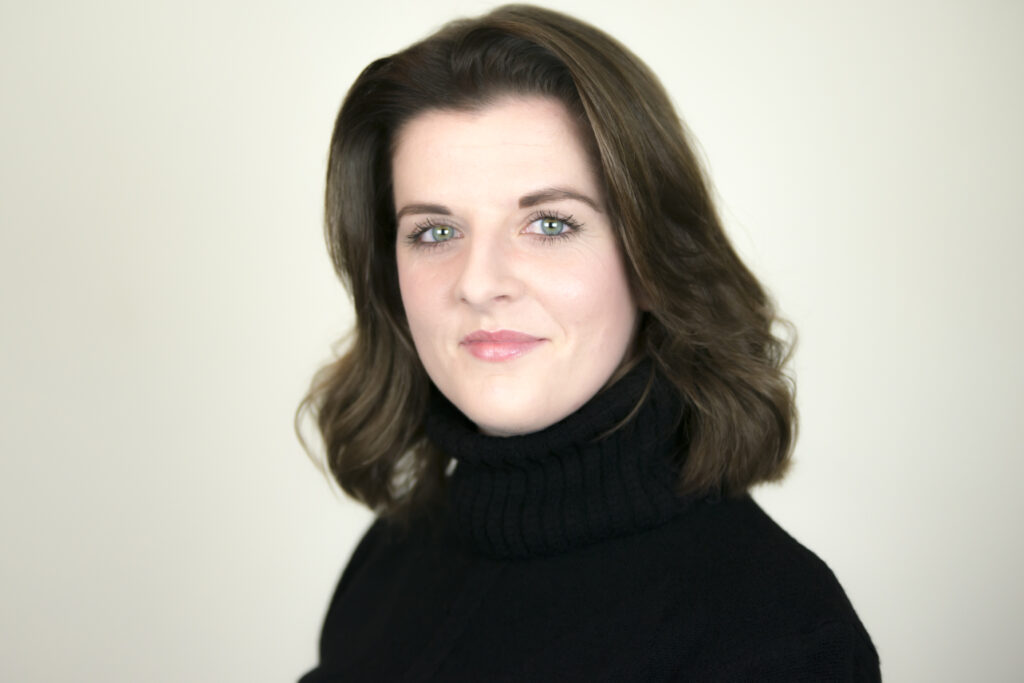
What inspired you to write The Shadow Order?
There were a number of elements which came together to inspire this book, but it began with my dogs. I had three dogs when I started thinking about the novel – Betsy, Teddy, and Effie – and I was walking them along the beach one morning and enjoying their antics, when I started to think about our shadows, which were stretched out and distorted by the rising sun. That made me think about the ways in which other people’s perceptions of us are so often influenced by things we lack any control over, and how difficult it can be to reveal your true self. The Shadow Order grew out of that idea on that walk, and I suppose that’s why the dogs became so tied into it. The characters of Betsy, Teddy, and Effie in the novel share not only the dogs’ names, but their personalities, too, which made writing it a lot of fun.
Tell us a little about the story…
The Shadow Order is a fantasy novel, set in a world where people’s shadows suddenly start to change shape and reveal their innermost fears, hopes, and feelings, rather than their physical forms. The novel opens one year after this strange event, by which time the Unified Government of Copperwell has brought in the Shadow Order – a law declaring that citizens must keep their shadows hidden at all times and can therefore only venture outside under cover of darkness. In the opening chapter, the main characters – Betsy, Teddy, and Effie – break this law and sneak out to watch the sun rise, but end up witnessing something altogether more troubling, which leads them on a quest to investigate the structures which surround them and also consider their truest selves.
Where do you draw writing inspiration from?
Everything and anything. In truth, I’ve never really sought out a story or thought about seeking inspiration from any particular source. I just hear or read or catch a glimpse of something – an image, a sound, a snippet of text – and the way that information settles in my mind is as story. It’s almost as though it’s an act of translation, as though that’s the way my brain processes the material. It’s a difficult process to describe, but it feels entirely natural to me. Stories and character rattle around my brain constantly, even when they’re pushed into the background by other things. They’re how I look at the world, I suppose. And once they’re embedded in my mind, I don’t know what do with them except write them down. If I can’t write for any reason, I don’t feel like myself.
What is the most difficult part of your writing process?
Writing is one of my greatest joys but carving out the time to do it between working a day job, freelancing, and now becoming a mother for the first time, really is difficult. Time is what I crave most. More time to write. In terms of the actual process, I genuinely enjoy almost all of it and certainly never think of any of it of torturous (except, perhaps, when you’re getting to the end of your edits!) but writing the first draft is my favourite part. The excitement and energy of getting the story down is just wonderful!
What comes first for you – the plot or the characters – and why?
Never the plot! I’m not a great plotter and I’m not too proud to admit it. Usually, it’s the characters who come first for me. That happens in different ways, though. More often than not, I ‘see’ the characters. I’m a very visual writer, and the best way to describe my writing method, I suppose, is as though there’s a film playing in my mind which I have to transcribe. That’s oversimplified, but it really is that visual for me. So I’m often introduced to my characters via an image, meaning that I sometimes get the character, a setting, a feeling all together, and then I have to work out whether that image is one I’m starting from and telling the story out of, or whether I’m writing towards that image as an end point, or somewhere between the two. A vague idea of story will grow out of those images, but I do find I have to write my way into the story before I really know it. I’ve never been capable of sitting down, plotting out a story, then sticking to those plot points. I’m envious of writers who can!
As to the ‘why’ part of this question… I really don’t know, as it’s not a conscious decision. It’s just the way it happens for me, and perhaps that will change as I write more books. The writing process for each book I have written to date has felt slightly different.
What, in your opinion, are the most important elements of good writing?
This is such a huge question! And one which crops up now and then, and which I always find equally difficult to answer. If I were to say something like ‘clarity’, that would be partly true, but there will always be stories or parts of stories which might demand obscurity. Perhaps the only honest answer I can give is to say that the writing I, personally, admire most is rich, visual, and revels in language. I love description. I love experimentation.
But that’s not for everybody, so if I were to try to talk about what constitutes good writing in a universal way, I suppose I would say that good writing makes you feel, and leave it at that, because none of us is an expert. Writers learn every time they sit down to write.
If you had to describe yourself in just three words, what would those be?
Determined, loyal, and fair. Although, I think those words would l change from day to day, perhaps depending on the challenges I’m facing at any given time.
What books inspired you as a young reader?
I talk a lot about the influence Philip Pullman’s Northern Lights had on me as a young reader. I read that book when it was first released, when I was about ten, and I was so enthralled by Lyra and her world – and of course Pantalaimon and Iorek Byrnison – that I decided that I would write an adventure story of my own. Twenty-five years, and four adult books, later I think I’ve just come closest to fulfilling that dream with my first children’s book, The Shadow Order.
Another book which stands out for me is Steeleye and the Lost Magic. I don’t have a copy anymore, so I can’t look back to see how much of my memory of it is correct, but what I loved about it was that you, the reader, had agency in the narrative. You would choose which way to go next and be directed to a certain page number, so the story was different every time, if you wanted it to be. That element of the book really appealed to me, as I felt I had some control over the story. I felt, perhaps, something like a writer.
What book is currently on your bedside table?
I’ve just closed the covers on Bonny and Read, by Julie Walker, which I loved, and I’m about to start Mercia’s Take by Daniel Wiles and The Dance Tree by Kiran Millwood Hargrave. All are historical fiction, and that’s definitely the genre I read most. I’m a slow reader, so I like to read a couple of books at a time, to try and negate the feeling that my slowness is causing me to miss out. It doesn’t, really. I always want to read more, faster, sooner. There are just too many good books!
If you could invite any three people for dinner, whom would you invite?
Elizabeth I, David Bowie, and Kate Williams. I couldn’t possibly choose three writers – there are just too many wonderful writers to choose from – so I won’t try! And these three figures (all dead) have long fascinated me. Elizabeth I because of her ability to rule successfully in an environment which was so male-dominated. I would love to be able to meet her and unpick how much of the legacy is true. It’s impossible to even imagine, don’t you think, what kind of a personality she was. David Bowie, because I’ve always enjoyed his music, and he was a mad lyricist. I think it would be great to talk to him about the lyrics he wrote, his process. And Kate Williams … Kate’s is a name not many people will recognise and wrongly so. Kate Williams was a Victorian Baptist Minister’s daughter, born in Abergavenny, who toured all over the world performing as the strongwoman Vulcana. I have written a fictionalised version of her life, which will be published in 2023, because I think she was an incredible woman. She was such a bold character, who campaigned against women wearing stays and advocated for women making themselves strong through physical exercise, and she lived a really exciting life. I can’t wait to share her story, or my version of it at least.
In what way have libraries influenced you during your lifetime?
There are a hundred positive things to say about libraries, and it’s so important that we keep using our libraries and keep them open, because they don’t just lend books. Of course they don’t. They offer escape to children who perhaps can’t afford books of their own. They provide a place of refuge for people who are lonely. Libraries are magical places. But for me specifically…
My parents are not big readers, but they have always encouraged my love of reading. We lived near Llanelli when I was growing up, and they would often take me to Llanelli library and, I think it’s laid out differently now, but then, in the early 1990s, you’d walk up a huge staircase to the first floor to the children’s section. In my memory, it was marble, but perhaps I was embellishing even then! Just walking up those stairs made me feel so grand and important, and walking back down them with a stack of books even more so. Long before I fully appreciated how much a library had to offer, I felt the joy of that ritual, the excitement of having so many books to choose from, the grandeur of an old building with wide stairs and huge windows. I felt that I belonged there, which fed my love of books enormously.
Do you have suggestions of how to encourage children and young people to read more for pleasure?
I think we have to offer young people a variety of reading matter, and I think we need to congratulate them on reading whatever best suits them – whether that’s novels, graphic novels, magazines, blogs, or even subtitles on television shows – rather than thrusting the same few titles at every child and expecting the same response. As long as they’re reading, there’s a chance that a love for it might be stimulated. I think, too, that we need to build time into their days to read just for reading’s sake, and not because they need to read this book for school or that book because it’s a classic. There are incredible teachers out there, I know, who offer their students wonderful adventures through books, but the school system can only offer so much, and it just doesn’t suit every child. There are children for whom school is challenging, there are children who see the same books being handed out that their parents read and disliked when they were at school, and that might well prevent them from seeing the potential for freedom inside. That’s what we need to enable children to do – to see a book cover and feel that it offers them freedom. And since everyone’s idea of freedom is different, surely variety is key to that.
I think building habit is key, too. My little boy is four months old now and already he has a little library of picture books which I sit and read to him. Just the act of him holding the book, looking at the pictures, will, I hope, build a habit which will allow him to discover the stories he wants and needs to enhance his life, in whatever form best suits him.
Do you have any plans for future titles?
Always! I’ve never not got ideas for a number of novels knocking about in my mind, and it’s always a tough choice to decide what to write next. I’m currently drafting a story set in a Welsh mine (that’s another adult book), which is perhaps the most gothic story I have attempted so far. And I’ve been thinking that I’d like to write more about Betsy, Teddy, and Effie, and where they go after The Shadow Order. I don’t think I’ve finished with those characters yet. I’ve also wanted to write a novel set on a ship for a really long time, but I haven’t been able to find the right story; lately, though, I think I might have found the characters who belong on that ship. The idea is still quite nebulous at the moment – I’ll have to let it simmer a while longer before I put pen to paper – but those characters are becoming more fleshed out now, more real, and soon they will occupy my mind and force me to start to write.
The Shadow Order will be published 15 September by Firefly Press (Twitter @fireflypress)
Read our Get to Know the Author flyer for further information about the author.
See also our Authors of the Month writing in Welsh.

